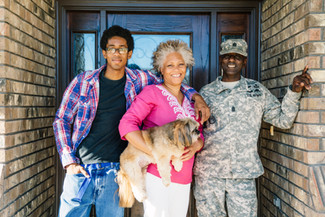"Paws and Ponder: A 5-Step Guide to Choosing the Right Dog for Your Family"
- Dough ReMia
- Mar 22, 2024
- 5 min read
Updated: Apr 4, 2024
Welcome to Dough ReMia's Doggie Dough blog, where we not only share delightful recipes for homemade dog treats but also valuable insights into the world of canine companionship! While baking delicious treats is undoubtedly fun, it's equally important to ensure that you're choosing the right furry friend to share those treats with. Choosing a dog isn't just about their "cuteness;" it involves careful consideration of various factors to ensure a harmonious fit for your family. Let's discover how to choose the perfect pooch for you and your family.
1. Assess Your Lifestyle:
Before bringing a dog into your home, take a close look at your lifestyle. Consider factors such as your work schedule, activity level, living situation, and family dynamics.
Dogs have diverse needs and energy levels, so it's essential to choose a breed or mix that aligns with your lifestyle. For instance, high-energy breeds like Border Collies or Australian Shepherds thrive in active households with plenty of exercise opportunities, while laid-back breeds like Bulldogs or Basset Hounds may be better suited to more relaxed environments.
Ask yourself these questions:
Living situation: Do you live in a spacious house with a yard, or are you in a compact apartment in the city?
Activity level: Are you an active family that enjoys outdoor adventures, or do you prefer cozy evenings at home?
Time commitments: How much time can you dedicate to exercising, training, and bonding with your new furry friend? How much time do you spend away from home for work or other outside commitments?
Allergies: Are any family members allergic to pet dander?
Understanding your lifestyle will help you narrow down the breeds
that are best suited to your family's unique circumstance.
2. Research Breeds and Personalities:
Once you have a clear picture of your family's lifestyle, it's time to research different dog breeds. There are so many amazing dog breeds out there! Each breed has its own set of characteristics, including size, energy level, grooming needs, and temperament.
Some breeds are known for their friendliness and adaptability, making them great choices for families with children, while others may require more experienced owners or specific living environments. All dogs are adorable, but it is important that you consider the right breed for your specific needs. It’s easy to get excited about the thought of having a dog, but it is only fair to you and your new furry friend that it is a good match!
Consider factors such as size, grooming needs, trainability, and compatibility with children or other pets. Keep in mind that individual dogs within a breed can vary in temperament, so meeting and interacting with prospective pets is crucial.
Consider breeds that match your activity level and living space.
Research breed-specific traits and behaviors to ensure compatibility with your family dynamics.
Explore rescue organizations and shelters, as mixed-breed dogs can offer a unique blend of characteristics and make wonderful companions.
3. Evaluate Your Space:
Your living space plays a significant role in determining the type of dog that's suitable for your family. Consider factors such as the size of your home, yard space, and any restrictions imposed by landlords or homeowners' associations. A fenced in yard or electric fence might be helpful if you plan to "let the dog out" in place of a walk to do their business.
Larger breeds may require more space to roam and exercise, while smaller breeds or toy breeds can adapt well to apartment living with sufficient daily walks and playtime indoors. Smaller dogs can also can learn to do their business on "wee wee pad" if you do not have enough space or time to walk your dog multiple times of day.
4. Consider Your Family Dynamics:
When choosing a dog, it's essential to consider the needs and preferences of all family members. Discuss responsibilities such as feeding, grooming, training, and exercise to ensure everyone is on the same page. A new dog, especially a puppy, is definitely an added responsibility!
If you have children or other pets, prioritize breeds known for their friendliness, patience, and compatibility with younger family members or other animals. Supervised introductions and gradual acclimation can help ensure a smooth transition for everyone involved.
5. Adoption vs. Breeder:
Decide whether you'll adopt a dog from a shelter or rescue organization or purchase a puppy from a reputable breeder. Both options have their pros and cons, so weigh factors such as breed availability, age, temperament, and the opportunity to provide a loving home to a deserving animal.
Adoption not only saves a life but also opens up space in shelters for other animals in need. Many wonderful dogs are waiting for their forever homes in shelters, offering the opportunity for a meaningful and rewarding adoption experience.
Visit Shelters and Rescues:
Once you've identified a few breeds that seem like a good fit for your family, consider visiting local shelters and rescues. Meeting dogs in person allows you to assess their personality, energy level, and compatibility with your family members.
Take your time interacting with different dogs to see how they respond to you and your family.
Ask shelter staff for insights into each dog's background, temperament, and any special needs.
Consider adopting an older dog, as they often come with established personalities and may be less demanding than puppies.

Schedule a Meet and Greet:
If you're considering adopting from a breeder, arrange a meet and greet with the puppies or adult dogs available. This allows you to observe the dogs' behavior and temperament in person and ask the breeder any questions you may have about their breeding practices and health history.
Pay attention to how the dogs interact with each other and with you and your family members.
Ask the breeder for references and inquire about health screenings and genetic testing for hereditary conditions.
Trust your instincts and choose a dog that feels like the perfect fit for your family. Sometimes it is simply love at first sight!
Consider your budget. DIfferent breeds have different price tags.
CONCLUSION:
Choosing the right dog for your family is a big decision that requires careful consideration and research. By assessing your lifestyle, researching breeds, evaluating your living space, considering family dynamics, exploring adoption options, and scheduling meet and greets with potential furry companions, you can find the perfect pooch to enrich your life and bring even more love, joy and laughter to your home than you can even imagine.
Remember, a dog isn't just a pet; they're a beloved member of the family deserving of love, care, and companionship. Adopting a dog is not just about finding the right pet – it's about finding a lifelong friend and a new member of the family!
LINKS:
*Link to "Best Family Dogs" https://www.akc.org/expert-advice/dog-breeds/best-family-dogs/
*Link to "Hypoallergenic Dog Breeds" https://www.goodhousekeeping.com/life/pets/g4503/dogs-that-dont-shed/
*Link to "Best Dog Breeds for Seniors" https://www.forbes.com/health/healthy-aging/best-dogs-for-seniors/
Stay tuned to Dough ReMia's Doggie Dough blog for more tips on delicious homemade treats and canine care to pamper your (new) furry friend!




























Comentarios